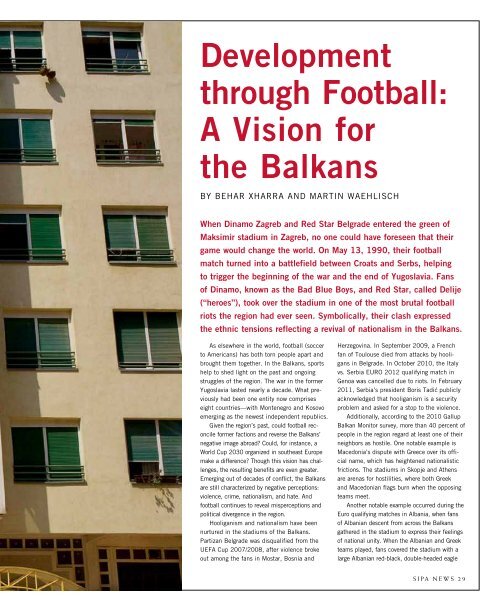SIPANewS - SIPA - Columbia University
SIPANewS - SIPA - Columbia University
SIPANewS - SIPA - Columbia University
Create successful ePaper yourself
Turn your PDF publications into a flip-book with our unique Google optimized e-Paper software.
Development<br />
through Football:<br />
A Vision for<br />
the Balkans<br />
BY BEHAR XHARRA AND MARTIN WAEHLISCH<br />
When Dinamo Zagreb and Red Star Belgrade entered the green of<br />
Maksimir stadium in Zagreb, no one could have foreseen that their<br />
game would change the world. On May 13, 1990, their football<br />
match turned into a battlefield between Croats and Serbs, helping<br />
to trigger the beginning of the war and the end of Yugoslavia. Fans<br />
of Dinamo, known as the Bad Blue Boys, and Red Star, called Delije<br />
(“heroes”), took over the stadium in one of the most brutal football<br />
riots the region had ever seen. Symbolically, their clash expressed<br />
the ethnic tensions reflecting a revival of nationalism in the Balkans.<br />
As elsewhere in the world, football (soccer<br />
to Americans) has both torn people apart and<br />
brought them together. In the Balkans, sports<br />
help to shed light on the past and ongoing<br />
struggles of the region. The war in the former<br />
Yugoslavia lasted nearly a decade. What previously<br />
had been one entity now comprises<br />
eight countries—with Montenegro and Kosovo<br />
emerging as the newest independent republics.<br />
Given the region’s past, could football reconcile<br />
former factions and reverse the Balkans’<br />
negative image abroad? Could, for instance, a<br />
World Cup 2030 organized in southeast Europe<br />
make a difference? Though this vision has challenges,<br />
the resulting benefits are even greater.<br />
Emerging out of decades of conflict, the Balkans<br />
are still characterized by negative perceptions:<br />
violence, crime, nationalism, and hate. And<br />
football continues to reveal misperceptions and<br />
political divergence in the region.<br />
Hooliganism and nationalism have been<br />
nurtured in the stadiums of the Balkans.<br />
Partizan Belgrade was disqualified from the<br />
UEFA Cup 2007/2008, after violence broke<br />
out among the fans in Mostar, Bosnia and<br />
Herzegovina. In September 2009, a French<br />
fan of Toulouse died from attacks by hooligans<br />
in Belgrade. In October 2010, the Italy<br />
vs. Serbia EURO 2012 qualifying match in<br />
Genoa was cancelled due to riots. In February<br />
2011, Serbia’s president Boris Tadić publicly<br />
acknowledged that hooliganism is a security<br />
problem and asked for a stop to the violence.<br />
Additionally, according to the 2010 Gallup<br />
Balkan Monitor survey, more than 40 percent of<br />
people in the region regard at least one of their<br />
neighbors as hostile. One notable example is<br />
Macedonia’s dispute with Greece over its official<br />
name, which has heightened nationalistic<br />
frictions. The stadiums in Skopje and Athens<br />
are arenas for hostilities, where both Greek<br />
and Macedonian flags burn when the opposing<br />
teams meet.<br />
Another notable example occurred during the<br />
Euro qualifying matches in Albania, when fans<br />
of Albanian descent from across the Balkans<br />
gathered in the stadium to express their feelings<br />
of national unity. When the Albanian and Greek<br />
teams played, fans covered the stadium with a<br />
large Albanian red-black, double-headed eagle<br />
<strong>SIPA</strong> NEWS 29

















